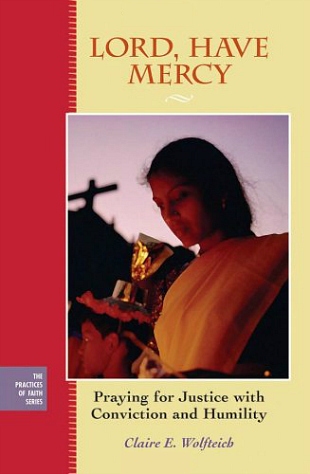"Prayer, then, is critical in an engaged life. It is also where we meet some of the most difficult spiritual questions. It is when we try to pray that we face head-on our questions about where God is, who we are, how we can come to know God and God's purposes. I was recently gripped by a news story about a carload of seven children — as young as twenty months — all killed in a fiery crash in Florida. A fifteen-year-old was driving. A tractor-trailer behind her smashed into the car, pushing it into a school bus stopped in front of her. The car burst into flames and the five adopted foster children and their two cousins died. On hearing the news, the grandfather of the children collapsed and died of a heart attack. The family was left with loss — total, abrupt, incomprehensible loss. It is a deeply troubling story, perhaps particularly awful to me as I am the mother of small children. I have not found it easy or natural to pray about the situation; in fact I have carefully kept the story at a distance. Why? I suspect that I possess no language to put my feelings into words for prayer, and I am hesitant to ask the big questions that would tumble out if I let them. How could this happen? Where was God in this? How on earth will the families of those children live through the pain?
"I could pray for those children. I could pray for some measure of comfort and peace for the family. Yet these prayers seemed to keep a lid on the underlying, heartbreaking question: How could this happen? There are many events posing such questions, even more pressing in situations where suffering results from intentional human action (a husband murders his wife and child, a woman is raped, terrorists commit mass murder). There we are forced to wonder what evil is in human beings. How do we make sense of the awful things that people do to one another?
"The gospels clearly invite us to bring our requests to God. The Lord's Prayer is filled with petition ('give us this day our daily bread . . forgive us our debts . . . rescue us from the evil one'; Matthew 6:9-13). In the gospel of Luke, Jesus teaches the disciples this prayer and then directly tells them a parable about a person roused from sleep in the middle of the night by the persistent knocking of a friend who requests bread. 'So I say to you, ask, and it will be given to you; search, and you will find; knock, and the door will be opened for you. For everyone who asks receives, and everyone who searches finds, and for everyone who knocks, the door will be opened' (Luke 11:9-10).
"Still, if we pay any attention to what is happening in our world, we may find ourselves wondering whether God does intervene in the course of human action or natural events. Does petitionary prayer make any sense? In fact, many people today, given our extraordinary exposure to events happening across the globe and our science-oriented mind-set, understandably question whether their prayer matters. Does our prayer actually change God's mind, drawing God to act in a way that God would not otherwise act? Or does prayer at least transform us, calm us down, foster compassion, shape our action? These are tough questions.
"We also face the problem of discerning God's will, not in generalities but in the particularities of concrete situations. It is one thing to affirm that God desires justice and dignity for all. It is another thing to be specific about what that means in any particular policy debate, be it about foreign policy or stem cell research or abortion. Deciding how faith leads to a certain course of action becomes complicated. Our understanding of the facts of the situation may be incorrect or incomplete. We may not accurately predict the consequences of how we act &151; what will happen if this person gets elected, or this law gets passed, or this program is put in place. Choices are often messy, with no pure moral option. On top of all this, discernment of what God wills is by its nature a humble, complex process prone to self-deception and the limitations of human knowledge.
"I suspect that prayer fully engaged with the social and political events of the world challenges our theology, raising questions we may want to dismiss with easy answers or compartmentalization of spirituality away from the 'world.' But there in the mix of both conviction and confusion, our prayer is most real and earnest. There is, I think, a place for praying the confusion. The Reformed theologian and pastor Karl Barth, for example, composed this pastoral prayer: 'Remain unchanging, 0 God, both above and in the human actions and events of our days, so confusing and confused, oppressing and oppressive.' "
